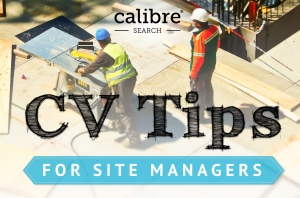Displaying items by tag: Leeds
Whilst this blog is aimed more towards Housing Site Managers it will still be worth a read for Commercial professionals also. Read on to find out how to create a CV that will you stand you out from the crowd and really impress employers.
1. Don’t forget... personal profile
Your personal profile should be a well written 'snapshot' of your career to date. Include in this your current role, the next steps you plan to take and how your previous experience makes you the right person for the job (if you’re not sure on this have a look at the Job Description or Advert – our site manager job adverts can be found here). It's worth investing time on this summary, because it could be your only chance to grab the employer's attention. Whether from agencies or employers, many recruiters won't necessarily use a CV management system that will display your covering letter - it's important, therefore, to say in your profile why you are applying for the role. If your specific objective is relocation, for example, but you don't mention this explicitly in your CV, you could be dismissed when they see your address is out of commuting range.
2. Show your strengths
It’s obviously important to highlight your strengths but what you need to do is leave the reader in no doubt that you are good at it. For example, rather than saying you have management experience give specific examples e.g. ‘I managed up to 50 trades with anything up to 15 plots in build phase whilst achieving 95%+ customer satisfaction and zero accidents on site proving a proficiency in health and safety.’ Demonstrating you have strong management experience is much better than just saying it.
3. Project Particulars
Include all the specifics of recent projects. The size of the site, from both a production and financial perspective, should be mentioned. For example, if the project consisted of 60 dwellings with a value of circa £5m and a completion programme of 18 months then say so. This information really helps an employer or recruiter to understand the type of environment you are used to, or, if you are adaptable to different build programmes.
4 Qualifications and awards
Your qualifications are hugely important. As a bare minimum, all Site Managers must have CSCS, SMSTS and First Aid. An HNC/HND or NVQs in site management can also give you an edge over other candidates. It’s also a good idea to note any awards and industry achievements that you have won or been shortlisted for, in particular NHBC awards such as pride in the job. Use your CV as a tool to both inform and impress.
5 Career highlights and challenging projects
It’s always good to shout about your greatest achievements, especially when it comes to challenging projects or delivering on a large scheme. For example, if you have worked on a pioneering contract, such as sustainable living eco-friendly housing, or just delivered a 200-plot site under programme make sure that it’s on there and not hidden away – remember the average reader scans a CV rather than read it fully in the first instance so make sure the juicy stuff is easy to find.
Still stuck?
Don't worry. The art of CV writing is a tricky one. Our specialist construction consultants are experts when it comes to writing a great CV, and we're just on the other end of the phone – you can phone us on 0113 234 6047. Alternatively email Jake Finch here and he will get in touch with you.
Interview coming up for an SEO job? Here are 7 things the interviewer will be looking for.
Interview coming up for an SEO job? Here are 7 things the interviewer will be looking for.
I’ve deliberately left out technically-focussed questions and concentrated on softer attributes but feel free to drop me a line with any you think I’ve missed and I’ll include them in a future blog.
1. Adaptability. The world of SEO is forever changing; even in the last few years the industry has changed remarkably, so prove that you are able to adjust to whatever challenges are thrown your way.
2. A desire to improve. You will never reach a point where you know everything about SEO so why stop learning? What SEO blogs are you reading to improve your skillset? If you’re not improving you are falling behind.
3. People skills. There’s a good chance that you will be speaking to clients, but even if that’s not the case you will need to work well with colleagues. If you’re not a natural people person that doesn’t mean you can’t improve. Work on cultivating your rapport and developing relationships.
4. Evidence. You will be asked for examples of your work so make sure you can detail website names, keywords, starting ranks, issues, software used, closing ranks etc and be able to explain your thinking.
5. Detail. Detail. Detail. This is an obvious one but it’s important to show that you don’t make mistakes easily and that’s all the way through the process from writing your CV, emails to the client, and turning up for interview at the right time.
6. Willing to get your hands dirty. SEO isn’t always glamorous. Even if you are more senior you will need to get stuck in so prove this to the client.
7. Commercially focussed. This is more relevant the more senior you are but having an understanding of companies’ commercial needs is important whichever side of the agency/clientside fence you are on.
As I say there are other points to add but hey, 7 is my favourite number.
If you would like to discuss any of these points further or would like to see what positions we are looking to fill please call Matthew Finlay on 0113 234 6047, email matthew.finlay@calibresearch.co.uk or visit our jobs page at http://www.calibresearch.co.uk/job-search/browse/marketing/jobs
If you want to have a look at the questions I’m advising my clients to ask at interview why don’t you have a look at my previous blog here.










